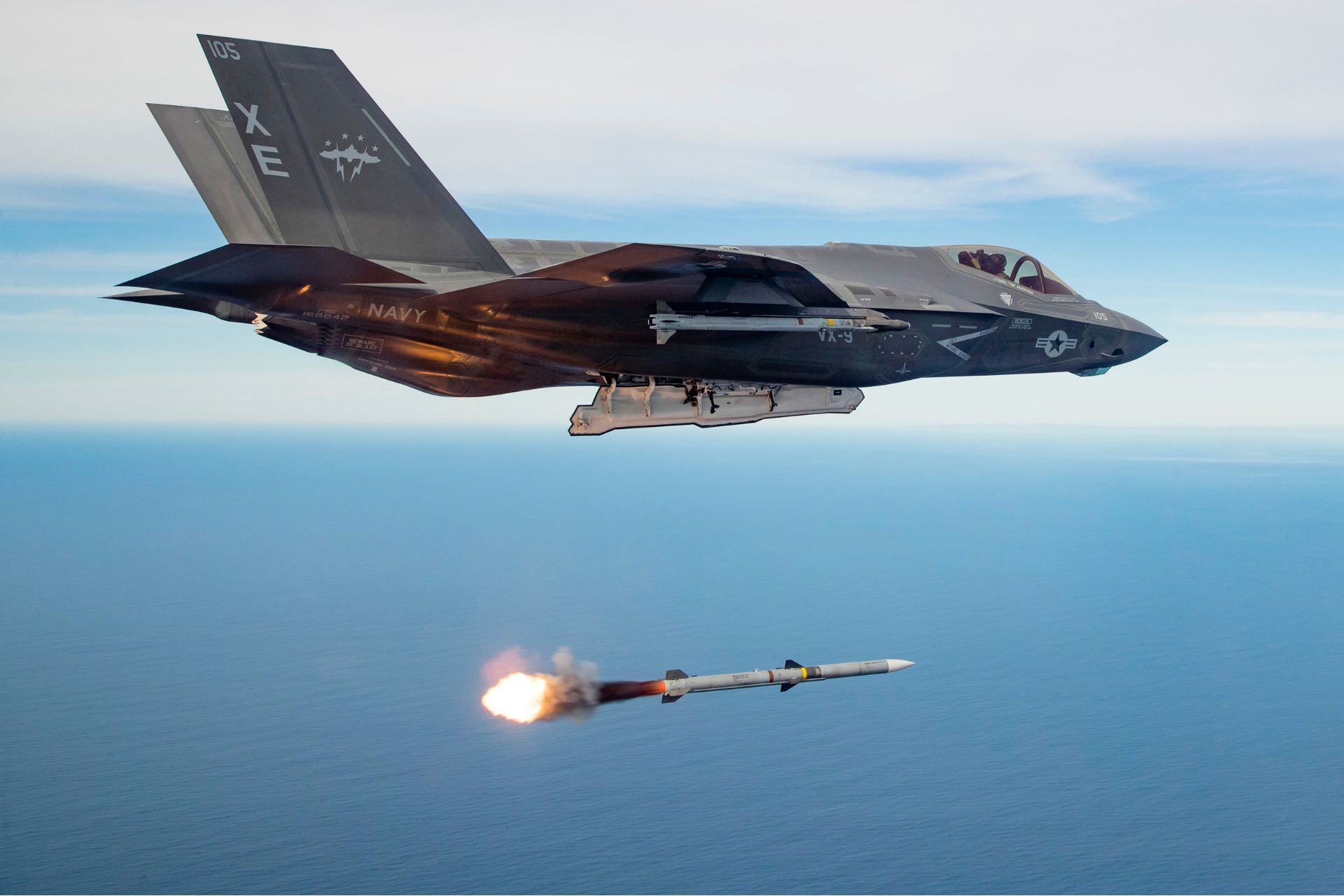Raytheon Secures $1.1 Billion Contract to Increase AMRAAM Production for Allied Nations

{loadposition bannertop}
{loadposition sidebarpub}
Raytheon, a division of RTX, received a $1.1 billion contract modification from the U.S. Department of Defense (DoD) on September 11, 2024, aimed at boosting the production of Advanced Medium Range Air-to-Air Missiles (AMRAAM) under Lot 38. This contract supports Foreign Military Sales (FMS) to a group of allied nations, including Bahrain, Bulgaria, Canada, Finland, Germany, Hungary, Italy, Japan, Norway, Switzerland, Ukraine, and the United Kingdom. Approximately $603 million of this amount will be funded by these partner nations.Follow Army Recognition on Google News at this link
The proven effectiveness and adaptability of the AMRAAM ensure its continued use in the air forces of various nations, whether on F-16s, F-35s, or European fighters like the Gripen and Tornado (Picture source: US DoD)
The AMRAAM, designated AIM-120, is an all-weather missile that has been in service for more than 30 years and is currently used by the air forces of 36 countries. Known for its versatility, this missile can be integrated with various combat aircraft, such as the F-15, F-16, F/A-18, F-22, and F-35, among others. It is also compatible with the Norwegian Advanced Surface to Air Missile System (NASAMS), further expanding its deployment capabilities.
Production of this additional Lot 38 will take place in Tucson, Arizona, with a completion date set for December 31, 2028. The previous Lot 37, awarded in 2023, is still under production and is expected to be completed by January 2027. This contract modification aims to deliver additional quantities of AMRAAM missiles, telemetry systems, spare parts, and production support equipment to meet growing global demand.
The AMRAAM missile, measuring 3.6 meters in length and weighing 150.7 kilograms at launch, carries a high-explosive fragmentation warhead of 18.1 kg. It can strike targets up to 30 nautical miles away using an onboard active radar and inertial navigation system, allowing it to operate independently from the aircraft’s fire control radar after launch. This “fire-and-forget” capability enables pilots to engage multiple targets simultaneously, making it a crucial tool in modern air combat.
The proven effectiveness and adaptability of the AMRAAM ensure its continued use in the air forces of various nations, whether on F-16s, F-35s, or European fighters like the Gripen and Tornado. It is noteworthy that the Bulgarian Air Force, while still operating Russian-made MiG aircraft, is transitioning toward Western platforms such as the Gripen, with 13 currently in service.
This latest contract award highlights the importance of maintaining a strong production line for the AMRAAM, addressing the needs of both U.S. military forces and their international allies.

{loadposition bannertop}
{loadposition sidebarpub}
Raytheon, a division of RTX, received a $1.1 billion contract modification from the U.S. Department of Defense (DoD) on September 11, 2024, aimed at boosting the production of Advanced Medium Range Air-to-Air Missiles (AMRAAM) under Lot 38. This contract supports Foreign Military Sales (FMS) to a group of allied nations, including Bahrain, Bulgaria, Canada, Finland, Germany, Hungary, Italy, Japan, Norway, Switzerland, Ukraine, and the United Kingdom. Approximately $603 million of this amount will be funded by these partner nations.
Follow Army Recognition on Google News at this link
The proven effectiveness and adaptability of the AMRAAM ensure its continued use in the air forces of various nations, whether on F-16s, F-35s, or European fighters like the Gripen and Tornado (Picture source: US DoD)
The AMRAAM, designated AIM-120, is an all-weather missile that has been in service for more than 30 years and is currently used by the air forces of 36 countries. Known for its versatility, this missile can be integrated with various combat aircraft, such as the F-15, F-16, F/A-18, F-22, and F-35, among others. It is also compatible with the Norwegian Advanced Surface to Air Missile System (NASAMS), further expanding its deployment capabilities.
Production of this additional Lot 38 will take place in Tucson, Arizona, with a completion date set for December 31, 2028. The previous Lot 37, awarded in 2023, is still under production and is expected to be completed by January 2027. This contract modification aims to deliver additional quantities of AMRAAM missiles, telemetry systems, spare parts, and production support equipment to meet growing global demand.
The AMRAAM missile, measuring 3.6 meters in length and weighing 150.7 kilograms at launch, carries a high-explosive fragmentation warhead of 18.1 kg. It can strike targets up to 30 nautical miles away using an onboard active radar and inertial navigation system, allowing it to operate independently from the aircraft’s fire control radar after launch. This “fire-and-forget” capability enables pilots to engage multiple targets simultaneously, making it a crucial tool in modern air combat.
The proven effectiveness and adaptability of the AMRAAM ensure its continued use in the air forces of various nations, whether on F-16s, F-35s, or European fighters like the Gripen and Tornado. It is noteworthy that the Bulgarian Air Force, while still operating Russian-made MiG aircraft, is transitioning toward Western platforms such as the Gripen, with 13 currently in service.
This latest contract award highlights the importance of maintaining a strong production line for the AMRAAM, addressing the needs of both U.S. military forces and their international allies.





